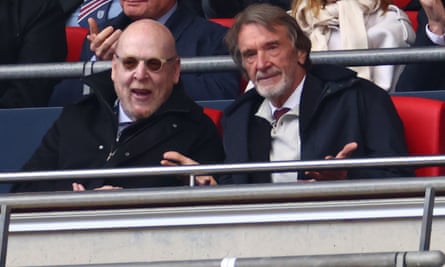A player exodus, a temporary building downgrade to make way for the men’s team, the players’ union on alert and disappointing comments coming from the top. It has been a busy few days for all invested in the future of Manchester United’s women’s team.
Since the side’s relaunch in 2018 there have been questions about the intent and commitment of the club. Did the hierarchy really want a women’s team, or were they just responding to criticism? Did the opportune timing, with the Football Association having restructured the pyramid to allow teams to skip having to rise through the leagues, play a part?
The initial signs were promising as the team entered the Championship, with Casey Stoney arriving as manager and a host of talented United academy products returning to the fold.
A Championship trophy and promotion to the Women’s Super League was delivered in their first season, followed by two fourth‑place finishes in the WSL. But in 2021, before the end of her contract, the well-liked Stoney announced her departure. Initially, it is said, United had persuaded her to stay but it wasn’t enough. Tensions had grown between the club and the manager over several issues, including the quality of training facilities and the squad having to fit around the men’s schedule once they moved to Carrington. Alarm bells rang.
Marc Skinner was lured back to England from Orlando Pride to take over from Stoney. United were WSL runners-up in 2022-23; they were fifth last season but won the FA Cup, their first piece of major silverware. “This has to be the impetus and that springboard for us, knowing that we can deliver success for this fantastic club,” Skinner said.
But rumours suggesting a lack of commitment from the club have rumbled on, and were given new life by comments in an interview with the minority owner, Sir Jim Ratcliffe, at a time when fans were hoping for support and investment. Asked about what they were doing for the women’s team, Ratcliffe said: “Well they’ve just won the FA Cup.” Imagine, though, if he had answered in the same way to a question about what he was doing with the men’s team? Everyone understands, Ratcliffe apparently better than anyone, that the men’s FA Cup win deflected from a poor league season and much deeper problems. He did not seem to have the same grasp of the issues with the women’s team.

When asked if he had thought of spinning off the women’s team as a standalone entity, like Chelsea have done this summer, Ratcliffe, whose 27.7% stake in the club was finalised in February, said: “We haven’t gone into that level of detail with the women’s football team yet. We’ve been pretty much focused on how do we resolve the first-team issues, in that environment, and that’s been pretty full-time for the first six months.” The reference to “first-team issues”, ignoring the women’s side, was telling. He then responded “correct” when asked whether plans were “TBC”.
Ratcliffe chose to miss the Women’s FA Cup final in favour of a Premier League game between the men’s team and Arsenal, a game of little consequence for United. (The co-owner, Avram Glazer, did make it to Wembley.) Ratcliffe’s record in cycling, too, suggests a lack of interest in women’s sport. His Ineos Grenadiers, formerly Team Sky, do not have a women’s road team, even though many other teams of comparable size do.
Worrying news has kept coming. The Guardian revealed that because of a £50m modernisation of the men’s first-team building at Carrington, the women’s team will be relegated into temporary cabins to allow the men’s team to use the £10m women’s and academy building for the entire 2024-25 season.
Skinner has signed a new one-year contract after an end-of-season review. But that hardly constitutes a massive vote of confidence and there are continued signs of recruitment problems. Across three transfer windows Skinner has signed 13 players, but six of those have left having failed to break into the first team. Of those six, four have played fewer than 100 minutes of football. Alessia Russo and the goalkeeper Emily Ramsey, both lifelong United fans, left last year. Last week it was also confirmed that Mary Earps, the England goalkeeper, was leaving, with her sights set on Paris Saint‑Germain, along with Katie Zelem, who will depart on a free.
after newsletter promotion
All these issues have an impact on Manchester United’s ability to recruit, with several agents the Guardian has spoken to saying they would avoid sending players to the club if they could. It is understood that there are frustrations with a lack of clarity and uncertainty on key issues, a lack of news on contracts, issues with day-to-day logistics and in many other areas.
United evidently have the potential fanbase for a women’s team. Despite the turmoil, they pulled off an FA Cup win. Imagine what could be achieved if Ratcliffe and those around him gave it their all? Dan Ashworth, the Newcastle United sporting director on gardening leave until he can go to Old Trafford, is a supporter of women’s football; United’s new chief executive, Omar Berrada, presided over a spell of success for the women’s team when he was at Manchester City.
But the longer United wait, the harder the job of reputation-salvaging and catching up will be. Arsenal and Chelsea are already starting to turn profits from games in their main stadiums and are ramping things up commercially. The opportunity is there, but who wants to invest in a team, fans or sponsors either financially or otherwise, when the club’s driving forces seem so reluctant?
-
Do you have an opinion on the issues raised in this article? If you would like to submit a response of up to 300 words by email to be considered for publication in our letters section, please click here.
Source: theguardian.com


















